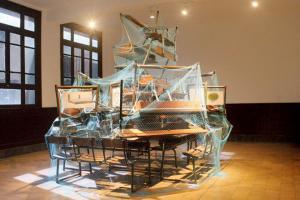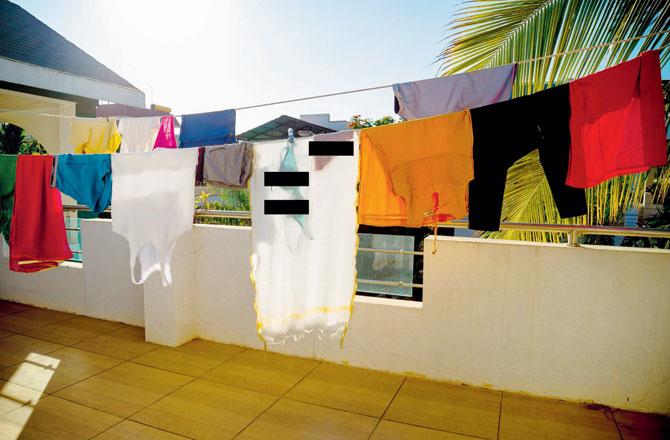Pune-based artist Rupali Patil explores social mores, etiquettes and gender roles associated with familiar as well as mysterious spaces

An installation of watercolour drawings on piled school benches, covered with a fishing net
 The space that we live in, rented or otherwise, is the one that we call home. But isn't that someone's idea of a house with a prototype of usage options? Pune-based artist Rupali Patil, 35, thinks and works around the impact of space on human thinking and mobility in her installation, Dilemma of Other Spaces. It was part of the exhibition, Why Binary Should Have All the Pun, at Pune's TIFA Working Studio where 20 artists investigated fluidity of spaces beyond inflexible binary structures. Patil's work, one-foot high cement sheets depicting the insides of an urban household, is complemented with two silent videos played on mobile phones placed at different corners. She features everyday images in customary spaces — a woman combing her hair, corners of her own home walls, and the moving feet of a festooned domesticated cart horse seen alongside human legs. She feels the familiarity of these spaces can be disturbing, much like the Heterotopia in everyday domestic activity which generates unlikely connotations; it makes her question the relation between 'the self' and 'the space'. Interestingly, Dilemma of Other Spaces is now back at her workshop, where it has triggered new thoughts on space for an upcoming video art presentation in Mumbai.
The space that we live in, rented or otherwise, is the one that we call home. But isn't that someone's idea of a house with a prototype of usage options? Pune-based artist Rupali Patil, 35, thinks and works around the impact of space on human thinking and mobility in her installation, Dilemma of Other Spaces. It was part of the exhibition, Why Binary Should Have All the Pun, at Pune's TIFA Working Studio where 20 artists investigated fluidity of spaces beyond inflexible binary structures. Patil's work, one-foot high cement sheets depicting the insides of an urban household, is complemented with two silent videos played on mobile phones placed at different corners. She features everyday images in customary spaces — a woman combing her hair, corners of her own home walls, and the moving feet of a festooned domesticated cart horse seen alongside human legs. She feels the familiarity of these spaces can be disturbing, much like the Heterotopia in everyday domestic activity which generates unlikely connotations; it makes her question the relation between 'the self' and 'the space'. Interestingly, Dilemma of Other Spaces is now back at her workshop, where it has triggered new thoughts on space for an upcoming video art presentation in Mumbai.
ADVERTISEMENT
Patil's work rests on feedback and dialogue, which is why she will be back to TIFA studios next week for the screening (followed by discussion) of the documentary titled Not For Display, which is made by a student of The Film and Television Institute of India. It deals with the embarrassment experienced by women while drying their innerwear on the clothesline. In 2017, Patil dealt with the embarrassment in her work, An Excitement Burning With Cold Flame, which was part of the Pune Biennale and was supposed to be later put on two major hoardings near Sambhaji Park. However, the hoardings were censored by the Pune Municipal Corporation because they featured a bra-panty silhouette. Patil has shared her rage against the municipality in the documentary. "Without even giving me a chance to explain, they declared it 'unpalatable' for public view," she quips, adding that the theme (hidden inners) stays with her and she is happy that a filmmaking student (Saadgi Gupta) is on the same page. "Norms need to be questioned and debated — be them about gender roles or urban space. And the etiquette of drying women's inners has bothered me forever. Why are women told to hide them and from whom? And why don't men feel the same need?"

An Excitement Burning With Cold Flame 2017, censored by Pune Municipal Corporation
Patil's observation of social norms started from her growing up days in Pune in the eighties, right from the time she watched movies of Federico Fellini, Akira Kurosawa, Ingmar Bergman and Andrei Tarkovsky at the Sudarshan Rangmanch. She was born in a Maratha family where both the parents were not city-bred. "My father lived in Pune but carried his ancestral village inside him and that is how he inevitably linked us to the Jalgaon-Dhule area," she recalls her vacations spent in the remote Waktuki. Her father was in the police force who at one point worked as the bodyguard of the iconic Osho Acharya Rajneesh, which exposed her to varied worldviews and Vipassana meditation. "I was lucky to retain different worlds within one world. In fact, I have not felt a distinct sense of belonging with any one place — neither Pune, nor Baroda where I did my post-graduation, and nor Mumbai where I started my art practice."
After completing her graduation from Pune's Bharati Vidyapeeth, Patil realised her interest in fine art and the reason she didn't want to pursue it in Pune. "Pune is not a small town, but it has its limitations with regard to the fine arts. Whenever I visited Mumbai, I realised how much Pune lacked in the experimental art scene," she explains her choice of M S University Baroda. "The campus was chosen because of the arts its taught and the chance it gave for exploring the inside space." It is another story that her inner exploration helped her choose her life partner Prabhakar Pachpute who was doing his Masters in sculpture, while she branched out in printmaking and graphics. Both of them later became core members of Mumbai's Clark House Initiative, a curatorial collective which tosses ideas of alternative and sustainable art practices. Their installations have been exhibited in Hong Kong Para Site (2014), 14th Istanbul Biennial (2015), STUK Leuven (2018); their joint residency and exhibition in Krakow was an interesting comparison between the Indian and Polish mining industry. Patil's focus remains intact on the role of female coal miners. She is innately drawn towards the themes of industrial exploitation of Nature and women. "Living in Indian society itself is enough reason to work on feminism and gender issues in art," she maintains.

Rupali Patil seen with her installation Dilemma Of Other Spaces. Pic/Vishal Kale
Patil comments on the situation around her — farmers' suicides or changing agrarian landscapes or sheer human existence. She is greatly inspired by Italian artist Giorgio de Chirico's quote: One must picture everything in the world as an enigma and live in the world as if in a vast museum of strangeness. It is the strangeness that she tries to capture through a range of mediums like engraving on the paper cutting mat, paper pulp, woodcut, jute threads, corrugated tin, iron, etching print and watercolour drawings. She recently held a woodcut workshop at her studio that initiated a dialogue on trying out new idioms of connectivity and expression.
Interestingly, her recent trip to the Velneshnar beach has inspired a video representation on another form of Heterotopia. She shot a variety of objects on the beach — toothpaste, wrappers, cartons, slippers, plastic bags — which she will add to her new video work which demonstrates the "the bits of city life we carry with us, while claiming to be in search of an off-city getaway." It is her way of underlining the inescapability of cities. Wherever you go, the network follows.
Sumedha Raikar-Mhatre is a culture columnist in search of the sub-text. You can reach her at [email protected]
Catch up on all the latest Crime, National, International and Hatke news here. Also download the new mid-day Android and iOS apps to get latest updates
 Subscribe today by clicking the link and stay updated with the latest news!" Click here!
Subscribe today by clicking the link and stay updated with the latest news!" Click here!






